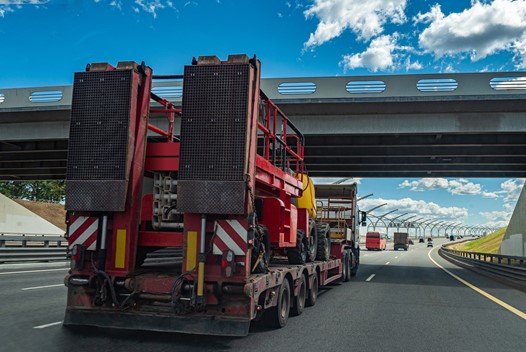Welcome to TransportsFriend.org: Your Ultimate Resource for the UK Transport and Logistics Industry
At TransportsFriend.org, we are committed to becoming one of the leading online platforms for professionals in the UK transport and logistics sector. Our mission is to equip you with the tools, knowledge, and community support needed to excel in this fast-paced industry. Whether you're a professional driver, fleet manager, or transport enthusiast, our website objective is to be your go-to resource for staying informed, compliant, and ahead of the competition in a fast-moving environment.
Comprehensive Industry Coverage
TransportsFriend.org will offer over time a wide range of resources tailored to the needs of the UK transport and logistics market. We will provide detailed guides, real-time industry news, and expert analysis to help you navigate the complexities of this dynamic sector. Our content will be specifically written and designed to cover the most critical areas, including drivers' hours regulations, tachograph compliance, fleet management, vehicle maintenance and driver compliance to name just a few.
Industry News and Analysis
We will focus on staying updated with the latest developments in the transport industry and crucially maintaining a competitive edge wherever possible. Our news section may provide some real-time updates on the latest trends, regulatory changes, and technological advancements that impact the UK transport sector. We hope to cover everything from emerging electric vehicle adoption and digital logistics solutions to new safety standards and legislation. Our analysis will help you understand these changes and how they affect your business, offering you insight into knowledge to adapt and thrive.
Detailed Regulatory Guides
Navigating the UK's complex regulatory environment can be challenging. TransportsFriend.org simplifies this by offering in-depth guides on essential regulations that impact the transport industry. Whether you need to understand AETR rules, UK-specific drivers' hours regulations, or how to stay compliant with tachograph requirements, our guides break down these topics into actionable steps. We hope to provide all the information for you to stay compliant with both UK and international laws, helping you gain some knowledge and hopefully avoid costly fines and disruptions to your operations.
Practical Tools and Calculators
Efficiency is key in the transport and logistics industry, and TransportsFriend.org is here to help you achieve this where possible. Over time our website features will offer a variety of practical tools and calculators designed to streamline your operations. From fuel consumption calculators to drivers' hours trackers, our tools will be designed for easy to use and tailored to the specific needs of UK transport professionals. These resources will help you manage your fleet more efficiently, optimize routes, and reduce operational costs, all while ensuring driver and fleet compliance with regulatory standards. Some of these services will be delivered by our partners TripleFleet, Availabledrivers, RoadRiskManager and others.
Driver Training and Development
Professional development is essential for success in the transport industry. At TransportsFriend.org, we will offer a range of resources and recommendations via TripleFleet driver training programs that meet the latest Driver CPC requirements and compliance needs. Our training materials will cover advanced driving techniques, safety regulations, and skills development, helping drivers enhance their capabilities and advance their careers. We will also keep you informed about the latest training technologies and methods, ensuring your drivers are well-prepared for the demands of the modern transport landscape.
Vehicle Maintenance and Safety
Maintaining your fleet in peak condition is crucial for safety and operational efficiency.. When our vehicle maintenance section is launched this will provide comprehensive advice on routine checks, advanced diagnostics, and preventative measures. We will cover critical topics such as brake inspections, tyre management, and the integration of the latest vehicle safety technologies. By following our maintenance guides, you can reduce downtime, extend the life of your vehicles, and ensure that your fleet meets all UK safety standards.
Environmental Sustainability
Sustainability is becoming increasingly important in the transport industry, and TransportsFriend.org is committed to helping you reduce your environmental impact. We will offer guidance on implementing eco-friendly practices, optimizing fuel efficiency, and adopting green technologies. Our content explores the benefits of transitioning to electric vehicles and other low-emission alternatives, helping you align your operations with the growing demand for sustainable transport solutions in the UK.
Community Engagement and Networking
At Transports Friend, we believe in the power of community. Our platform will connect you with a network of like-minded professionals in the UK transport industry. Through our forums, social media channels, and events, you can engage in discussions, share experiences, and learn from others in the field. Whether you’re seeking advice, offering insights, or simply looking to connect with peers, we hope to build a community to support you.
Fleet Management Solutions
Effective fleet management is essential for success in the UK transport sector. TransportsFriend.org provides targeted advice on fleet management strategies, covering areas such as route planning, driver scheduling, cost control and so much more. Our content will be designed to help you optimize your fleet’s performance, reduce operational costs, and improve overall efficiency. We also offer insights into the latest fleet management technologies, such as telematics and automated systems, driver compliance, and driver licence check software ensuring that you have the tools needed to stay compliant, and competitive, in a rapidly evolving industry.
Why Choose TransportsFriend.org?
- Industry Expertise: Our content will be created by professionals with deep knowledge of the UK transport and logistics sector, ensuring you receive accurate and practical information.
- Comprehensive Resources: From regulatory compliance to fleet management, our platform covers all aspects of the transport industry, making us your one-stop resource.
- User-Friendly Tools: Our practical tools and calculators will be designed to be intuitive and efficient, helping you manage your operations more effectively.
- Engaged Community: Join a willing and vibrant community of UK transport professionals and managers so you can benefit from shared knowledge, experiences, and support.
- Up-to-Date Information: We will attempt with best endeavours to keep you informed with the latest news, updates, and trends in the UK transport and logistics industry, so you’re always prepared for what’s next.
Join the Transports Friend Community
At TransportsFriend.org, our goal is to support the UK transport and logistics industry by providing high-quality, relevant, and practical information. Whether you’re a seasoned professional or new to the industry, our website will offer the resources you need to succeed. Explore our site which will be updated regularly as possible, take advantage of our tools when available, and join our community to stay connected with the latest developments in the transport sector.
Visit TransportsFriend.org today and discover how we can help you navigate the complexities of the UK transport and logistics industry with confidence and ease. Together, we can drive the future of transport forward.
Click on the Dyslexia Friendly tab in the bottom right-hand corner of your screen and choose the best background colour for improved reading. Reach out if need support, and contact the Dyslexia Association
Sponsored advertisers are welcome.
This site contains some public sector information licensed under the Open Government Licence v3.0
Source - Department for Transport (DfT)


